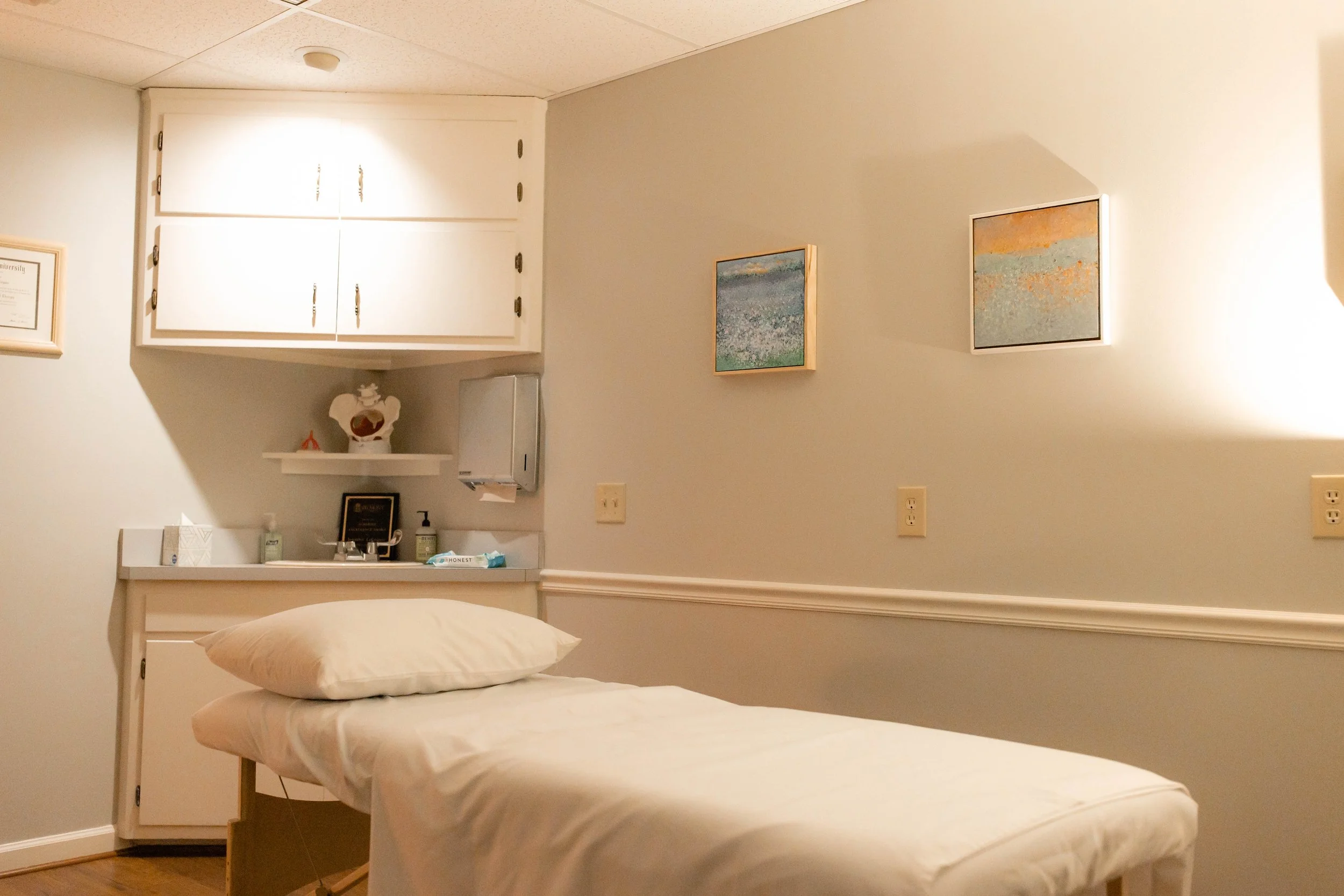Pregnancy and Postpartum
Pelvic floor therapy plays a pivotal role in supporting women through the journey of pregnancy, childbirth, and postpartum recovery. During pregnancy, tailored exercises and therapy can enhance pelvic floor strength and endurance, leading to reduced pregnancy discomfort and preparing you for birth. Our specialized therapists equip expectant mothers with techniques for managing pelvic pressure, optimizing posture, and preparing the pelvic floor for delivery. Postpartum, the focus shifts to healing and recovery, helping new mothers restore pelvic stability and muscle integrity, ensuring a quicker return to pre-pregnancy function. This holistic approach supports not just physical recovery, but also emotional well-being, setting the foundation for a healthy and active life with your new baby.
Common Pregnancy and Postpartum Conditions
-
Some common types of pregnancy-related pain include back pain, pelvic pain, and round ligament pain.
Pelvic floor therapy can be a very effective treatment for pregnancy-related pain. Our experienced pelvic floor therapists can teach you how to relax pelvic floor muscles, improve flow to the pelvis, and manage pain. Pelvic floor therapy is a safe and effective treatment for pregnancy-related pain. It can be started at any time during pregnancy and can continue postpartum. It is recommended to start pelvic floor therapy even as soon as your first trimester to start building up the skills for a successful delivery and postpartum recovery process.
-
Pelvic floor therapy can be a very effective way to prepare for childbirth. Our experienced pelvic floor therapists can help you to:
Strengthen your pelvic floor muscles: This can help to support your baby’s weight during pregnancy and labor, and it can also help to reduce the risk of tearing during childbirth.
Improve your pelvic floor flexibility: This can help make your childbirth experience easier and more comfortable.
Learn how to relax your pelvic floor muscles: This can help to reduce pain and tension during childbirth.
Learn how to push effectively: Pelvic floor therapists can teach you how to push effectively during childbirth, which can help to reduce the length of labor and the risk of complications.
In addition to these physical benefits, pelvic floor therapy can also help to improve your mental and emotional well-being as you prepare for childbirth. Our kind and caring pelvic floor therapists can provide support and education, and can help you to develop a positive and confident attitude toward childbirth.
-
Pelvic floor therapy can be a very effective treatment for postpartum recovery. Our pelvic floor therapists can help you to:
Strengthen your pelvic floor muscles: This can help to support your bladder, bowel, and uterus, and can also help to reduce the risk of incontinence and prolapse.
Improve your pelvic floor flexibility: This can help improve your sexual function and reduce pain during intercourse as you return to intimacy postpartum.
Learn how to relax your pelvic floor muscles: This can help reduce pain and tension, and can also improve your overall sense of well-being.
Address any postpartum complications: Pelvic floor therapists can help you to address any postpartum complications that you may be experiencing, such as diastasis recti (abdominal separation), urinary incontinence, and fecal incontinence.
In addition to these physical benefits, pelvic floor therapy can also help to improve your mental and emotional well-being as you recover from childbirth. Our compassionate pelvic floor therapists can provide support and education, and they can help you to develop a positive and confident attitude toward your postpartum recovery.
-
Pregnancy and childbirth can take a toll on your body, and your pelvic floor muscles are no exception. These muscles support your bladder, bowel, and uterus, and they also play a key role in sexual function. If your pelvic floor muscles are weakened or damaged, it can lead to pain, discomfort, and decreased sexual satisfaction.
Pelvic floor therapy can help to strengthen and relax your pelvic floor muscles, improve your flexibility, and reduce pain. It can also help you learn how to control your pelvic floor muscles during sex, which can improve your sexual arousal and orgasm. If you are struggling to resume intimacy after childbirth, pelvic floor therapy can be a lifesaver. It can help you to regain your confidence and satisfaction in your sexual relationships, and it can help you enjoy sex again.
-
A C-Section is a major surgery, and it can take time for your body to heal. Pelvic floor therapy can help you to recover more quickly and completely by focusing on the muscles and tissues that support your bladder, bowel, and uterus.
During pelvic floor therapy, you will learn how to strengthen your pelvic floor muscles, improve your pelvic floor flexibility, relax your pelvic floor muscles, and address any C-Section complications.
Pelvic floor therapy can help you reclaim your body after a C-Section by reducing pain and discomfort, improving bladder and bowel control, reducing the risk of postpartum complications, improving sexual function, and boosting your mood and confidence.
-
Diastasis Recti Abdominus is a condition in which the rectus abdominis muscles, also known as the six-pack muscles, separate along the midline of the abdomen. This can happen during pregnancy or from heavy lifting. DRA can cause pain, weakness, and a bulging stomach.
Our experienced pelvic floor therapists can help to treat DRA by teaching you exercises to strengthen your pelvic floor muscles and rectus abdominis muscles. They can also help you to improve your posture and breathing, which can help to reduce the appearance of DRA.
-
Pelvic Organ Prolapse is a condition in which the pelvic organs, such as the uterus, bladder, and rectum, sag or fall out of their normal position. This can happen due to weakening of the pelvic floor muscles, which are the muscles that support the pelvic organs. Pelvic Organ Prolapse can cause a variety of symptoms, including pelvic pressure or heaviness, difficulty emptying the bladder or bowel, pain during sex, back pain, and leakage of urine or stool.
Pelvic floor therapy is a highly effective treatment for Pelvic Organ Prolapse, and it is often the first-line treatment recommended by doctors. Our experienced pelvic floor therapists can teach you exercises to strengthen your pelvic floor muscles and improve your pelvic floor function. They can also help you to manage your symptoms and prevent further prolapse.
-
Urinary issues are common during pregnancy and postpartum. The most common urinary issue is urinary incontinence, which is the involuntary loss of urine. Urinary incontinence can be caused by a number of factors during pregnancy, including the increased weight of the uterus putting pressure on the bladder, changes in hormone levels, and the weakening of the pelvic floor muscles. Urinary incontinence can also be a problem after childbirth, due to the stretching and weakening of the pelvic floor muscles. Other urinary issues that can occur during and after pregnancy include overactive bladder or Pelvic Organ Prolapse.
Pelvic floor therapy is a very effective treatment for many of the urinary issues that can occur during pregnancy and postpartum. Our experienced pelvic floor therapists can teach you exercises to strengthen your pelvic floor muscles, which can help to improve bladder control and reduce or eliminate the leakage of urine. pelvic floor therapy can also help to improve your bladder function and reduce the frequency and urgency of urination.
-
Bowel dysfunction, which can include constipation, diarrhea, and fecal incontinence, may occur during or after pregnancy. Bowel dysfunction can be caused by a number of factors, including weakened pelvic floor muscles, the increased size of the uterus putting pressure on the intestines, changes in hormone levels, slowed digestion due to effects of progesterone, and a decrease in physical activity.
Pelvic floor therapy can be a very effective treatment for bowel dysfunction during pregnancy and postpartum. Our experienced pelvic floor therapists can teach you exercises to strengthen your pelvic floor muscles, which can help to improve bowel control and reduce or eliminate constipation and fecal incontinence. Pelvic floor therapy can also help to improve your digestive function and reduce bloating and gas.
Pregnancy and Postpartum Care at Nashville Pelvic Health
A welcoming space for your journey
From the moment you walk in the door, you will be greeted by our friendly and knowledgeable staff. We will take the time to answer your questions and make sure you feel comfortable and informed.Each of our fully private treatment rooms is equipped with state-of-the-art equipment and technology, so you can be confident that you are receiving the best possible care.
We are committed to providing our patients with the highest quality of care in a clean, comfortable, and welcoming environment. We want you to feel like you are part of our family, and we will do everything we can to make your visit as positive as possible.
Caring for the whole you, not just your symptoms
At Nashville Pelvic Health, we believe that the best way to achieve optimal health and well-being is to take a whole person approach. This means that we consider all aspects of your life, including your physical health, mental health, and emotional well-being, when developing a treatment plan.We also believe in building strong relationships with our patients. That’s why you will always see the same therapist at every visit. We want to understand your unique needs and goals so that we can provide you with the best possible care. We are here to support you every step of the way on your journey to better health.
Ready to start your journey to better pelvic health?
At Nashville Pelvic Health, we believe that everyone deserves to live a life free from pelvic pain and dysfunction. Our experienced pelvic floor therapists are here to help you achieve your pelvic health goals.
If you are ready to start your journey to better pelvic health, schedule an evaluation today by contacting us.


